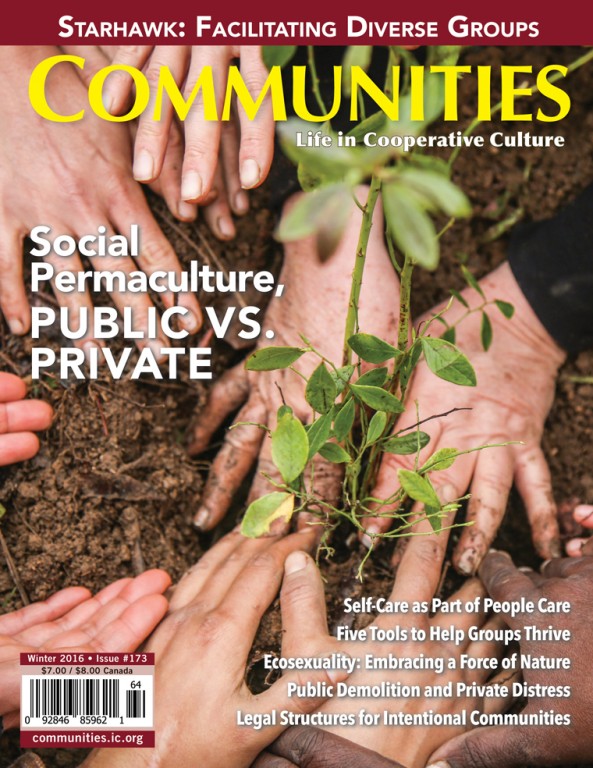
Issue #173 ● Winter 2016
Social Permaculture: Theme Articles
Social Permaculture—What Is It? By Starhawk
Ecological relationships are relatively easy to deal with. Human relationships are often much more difficult, but we can design social structures that favor beneficial patterns of behavior.
Surfing the New Edge of Permaculture: Looby Macnamara, Robin Clayfield, Rosemary Morrow, and Robina McCurdy By Delvin Solkinson, Annaliese Hordern, Dana Wilson, and Kym Chi
New understandings have the power to transform the people politics and internal messages that hold us back in earth-care activities and community projects.
Social Permaculture: Applying the Principles By Brush
Permaculture’s 12 principles apply to human groups just as much as to any other ecological system.
Seeking Out the Edges: A Permaculture Perspective By Alyssa Martin
As with the edges between biological communities or landscapes, living in or near a social edge may prove to be the most fertile and inspiring place to be.
Self-Care as Part of People Care: Social Permaculture for the Self By Hannah Apricot Eckberg
Permaculture principles can help us in all aspects of life, including healing and self-care.
Facilitating Diverse Groups By Starhawk
Social edges may become places of intense conflict and pain. Skilled facilitation can help assure that diversity brings growth, resilience, learning, and enrichment to our groups.
Five Tools to Help Groups Thrive By Melanie Rios
A clearly articulated evolutionary purpose, a welcoming of the whole self, and governance through self-management are keys to collective success.
Ecosexuality: Embracing a Force of Nature By Lindsay Hagamen
Only when we create a container that is loving enough and strong enough to embrace the erotic, do we create a container that is loving enough and strong enough to embrace all of Life itself.
Public vs. Private: Theme Articles
Public vs. Private: Group Dilemma Laid Bare! By M. Broiling and T. Shirtless
For some neighbors, the logical leap from “glimpse of skin” to “nudist colony” is a surprisingly short one to make.
The Private is Political or: There cannot be peace on earth as long as there is war in love By Leila Dregger
Privatization of our lives and loves—dividing us up into millions of little units called families—has made our world very small.
Preventing Child Sexual Abuse in Cohousing Communities By Linda B. Glaser
Predators don’t stay where they fear exposure. Be public, be clear, and be strong about your commitment to child safety.
Finding Balance of Public and Private in Community By Helen Iles
The erosion of the commons by private interests is a disaster for modern human settlements; a community without shared spaces is barely a community at all.
Lessons in Participatory Democracy By Sylvan Bonin
After being blindsided by “dumb growth” developments on their borders, Songaia residents debate how involved to become in protecting land beyond their own neighborhood.
Public Demolition and Private Distress By Nils McGinn
The privately-decided-upon destruction of a building sets off a domino effect in a community, with irreversible consequences in the public sphere.
Saying “No” to Prospective Members By Laird Schaub
The ability to say “no” to people who want to join your community but who are not a good fit can be one measure of your group’s maturity.
Legal Structures for Intentional Communities in the US By Diana Leafe Christian, Dave Henson, Allen Butcher, and Albert Bates
Among the decisions every group needs to make as it relates to the wider public is how to define itself in legal terms.
Nine Traditions that Draw Us Together: How a Small Town Nurtures Community By Murphy Robinson
The art of creating community spirit within mainstream towns and neighborhoods has much potential to change the world for the better.
Voices
Publisher’s Note Interconnectivity, Privilege, and Social Sustainability By Sky Blue
Notes from the Editor Not Rocket Science, but Just as Important By Chris Roth
The arts of cooperative living—supported tirelessly by the cash-strapped FIC, and worthy now more than ever of financial support—will be as essential as technical skills if our species is to survive on this planet or any other.
Avoiding “Sociocracy Wars”: How Communities Learn Sociocracy and Use It Effectively…Or Not By Diana Leafe Christian
Remembering Joani Blank By Laird Schaub
Review The Empowerment Manual By Kim Kanney
Review We Are As Gods By Tom Fels
Creating Cooperative Culture GPS Directions for Community By Valerie Renwick
















